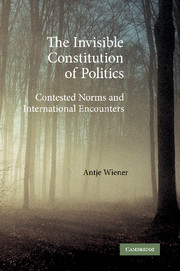Book contents
- Frontmatter
- Contents
- List of tables and graphs
- Preface
- 1 Introduction
- Part I Three theoretical moves
- 2 Constitutionalism beyond modernity
- 3 The dual quality of norms
- 4 Making normative meaning accountable for international relations
- Part II Case study: reconstructing the structure of meaning-in-use
- Part III Evaluation
- Annex
- References
- Index
4 - Making normative meaning accountable for international relations
Published online by Cambridge University Press: 22 September 2009
- Frontmatter
- Contents
- List of tables and graphs
- Preface
- 1 Introduction
- Part I Three theoretical moves
- 2 Constitutionalism beyond modernity
- 3 The dual quality of norms
- 4 Making normative meaning accountable for international relations
- Part II Case study: reconstructing the structure of meaning-in-use
- Part III Evaluation
- Annex
- References
- Index
Summary
[T]he practice not only fulfils the rule, but also gives it concrete shape in particular situations. Practice is … a continual ‘interpretation’ and reinterpretation of what the rule really means.
(Taylor 1993: 57)Introduction: bringing cultural practices back in
The previous chapters have addressed the emergent constitutional quality as a new phenomenon in world politics. It has been suggested that the political impact of this phenomenon should be addressed with reference to the role of norms. In two theoretical moves from constitutionalism to work on norms in international politics and law, these chapters have made the case for a contextualised approach which takes social practices into account. Notably, these practices have been distinguished as organisational practices which are predominant in modern constitutionalism and as cultural practices that have had stronger impact on ancient constitutionalism. The dual quality of norms’ assumption of the contextualised approach holds that social practices are always inextricably linked with norms. Under conditions of transnationalisation, social practices transgress the boundaries of organisational units with an impact on normative meaning that stands to be established empirically.
In a third move, this chapter addresses this empirical aspect. It operationalises the case study based on specific methodological details that are required for the project of making meaning accountable. To that end, it turns to discourse analysis.
- Type
- Chapter
- Information
- The Invisible Constitution of PoliticsContested Norms and International Encounters, pp. 59 - 86Publisher: Cambridge University PressPrint publication year: 2008

